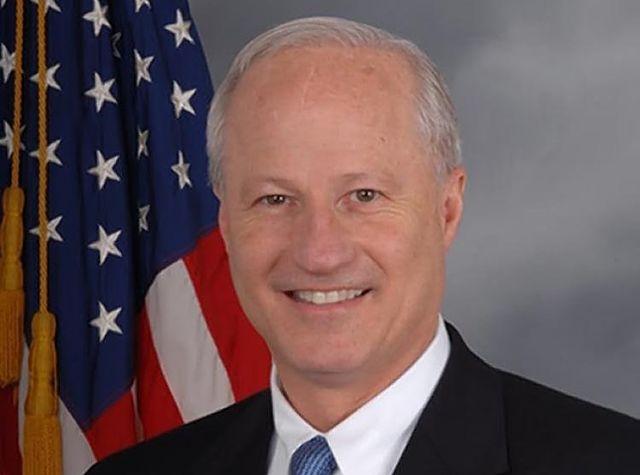NOVEMBER 20, 2017
In today’s highly partisan political landscape, crossover votes are becoming less and less common. But one Colorado congressman has successfully navigated political polarization and redistricting to successive victories, despite representing a district that typically favors a party different from his own at the presidential level.
Colorado is home to one of the only 35 congressional districts (out of 435) that voted for a congressman or woman of one party and voted for a different party at the presidential level in the 2016 election. That Colorado district is the 6th, where Republican Mike Coffman is serving his fifth term. He’s won re-election there three times since CO-6 shifted into a much more favorable environment for Democrats in 2011 after redistricting.
In 2016, Hillary Clinton won the district by almost 9 percentage points, but Coffman turned around and defeated Democrat Morgan Carroll here by over 31,000 votes, or by almost 8 percent. That means somewhere around 17 percent of the district’s voters, or nearly one in five, voted for both Clinton and Coffman.
Where are these voters coming from?
That question is hard to answer in a district with more than half a million registered voters, but Coffman’s outreach to immigrant communities has likely contributed greatly to his electoral success. Coffman is a regular at events from a variety of different cultures, frequently spending time with the local Korean and Vietnamese communities. His Latino community efforts include regular appearances on local Spanish television (speaking Spanish) and radio and owning a Spanish-only Twitter account.
But perhaps one group more than any other can offer a glimpse into CO-6’s high crossover votes for Coffman. Ethiopians, now Colorado’s second-largest minority group, constitute a significant (and growing) proportion of the vote in CO-6, which includes Aurora, where most of the state’s Ethiopian community resides. Exact numbers are hard to come by, but most estimates place the state’s Ethiopian community at around 30,000 to 40,000 strong, with the majority living in Aurora. Well-educated, entrepreneurial, diverse and increasingly politically active, Ethiopia’s Colorado community includes Christians, Muslims and Jews.
Coffman’s efforts since the 2011 redistricting have concentrated on the Ethiopian community, efforts that have been well received.
“On the issues that matter to us, Mike Coffman is standing with the Oromo people and the people of Ethiopia in general. He stands against injustice,” says Jamal Said, president of Ethiopia’s Oromo Community of Denver. “[Coffman] is very popular not just here, but wherever the Oromo community is in the United States. He is a household name.”
By all accounts, Coffman’s efforts in the Ethiopian community extend far beyond glad-handing for cameras. From offering citizenship-test classes at campaign offices to speaking out against the current Ethiopian government to even learning a few words of Amharic (“He butchers it,” laughs Coffman campaign spokesman Tyler Sandberg), Coffman has developed a strong bond with the Ethiopian community.
“Mike is the only person showing up, and the leaders are very appreciative,” Sandberg says. “He is so accessible out there in the community. For the Ethiopian and the Latin American community, he’s there. He’s showing up to Senegalese Independence Day [celebrations], he’s helping swear in new American citizens each month. Half the battle is just showing up, and he shows up.”
The first waves of Colorado’s Ethiopian community came to the States in the 1970s during the so-called Red Terror, when a Marxist military group known as the Derg killed an estimated 500,000 people in Ethiopia. The military group is widely blamed for exacerbating the effects of the Ethiopian famine of the mid-1980s that killed hundreds of thousands more.
As a result, Ethiopians are by and large averse to voting left of center because of their disdain for left-wing ideals like communism.
“A lot of Ethiopians are capitalists at heart,” says Yonas Ayalew-Mengistu, a local Ethiopian-American youth organizer who voted for Trump. “We had communists.”
While Ethiopians overall are unlikely to share most Republicans’ views on immigration, they are likely to support the party’s view on fiscal and social issues, such as health care.
“Typically, a lot of the folks that voted for [Coffman] are Democrats, but it’s a community that values relationships, and it’s also a community that has conservative values,” says Neb Asfaw, a community spokesman and co-founder of the Taste of Ethiopia festival. “There’s a perception that all minorities are Democrats, but that’s not the case, to my knowledge.”
Still, President Donald Trump is highly unpopular in the local Ethiopian community. Particularly upsetting to local Ethiopians is Trump’s recent call to end the Diversity Immigrant Visa (DV) Program, under which many Ethiopians arrived in Colorado in the 2000s. Trump’s discontinuation of the DACA program hit home for others as well.
—
Related:
Watch: Rep. Coffman of Colorado Speaks on Ethiopian Resolution (H.Res 128)
In Colorado, GOP Congressman Mike Coffman Enjoys Ethiopian Support (TADIAS)
Republican Congressman Mike Coffman Visits Four Ethiopian Churches in Colorado (TADIAS)
